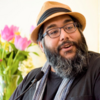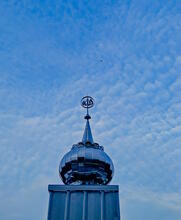The Path of Vigilant Mercy
The pandemic began with news of a death. Just as the first lockdown entered its second week, I was awoken before dawn by the news that my mentor of 25 years was in critical condition in a London hospital. A few hours later, a tearful phone call from his son confirmed the heartbreak I already felt was coming – journalist, campaigner, and interfaith visionary Fuad Nahdi had returned to God.
A few days later, doctors confirmed that while he had been struggling with several serious health conditions, he had—in the end—contracted Covid-19. We belong to God and to God we shall return.
There have been days when I’m afraid to open my social media accounts because I know I will find too many messages from friends announcing the passing of a loved one.
Those of us who loved Fuad shared our grief, lamented our loss, mourned our inability to be present as he was carried to the grave. We would not be present to place the dirt on his coffin and ask God to welcome him into the kingdom of souls and the company of the righteous.
There was something more too. A feeling that everything had changed.
We read about these moments in scripture. Moments that clearly demarcate a before time and an after time: the crossing the parted Nile during the exodus, the virgin Mary presenting her baby—Jesus—to her people, the moment Muhammad was embraced in the darkness of a cave by an angel who brought him the first verses of the final revelation. The world might appear the same, but we know everything has changed. Something has entered it that has altered it forever.
Our Sickness is Laid Bare
The pandemic has altered the world forever. We know the ways it has. It has also altered the way we see the world. We wear masks over our faces, present our arms to be vaccinated, maintain safe distance from each other, but we can no longer mask the inequalities around us as we did in the before times. The sickness is laid bare: the exploitation of working people, the denial of universal health care, unsafe labor conditions, and the absurd concentration of wealth in the hands of the few. Systemic white supremacy and anti-Black racism can never be disguised again. The murders of George Floyd and Breonna Taylor held us to account for all the names we could not remember and the victims that so many of us failed to account for. The pandemic was a revelation that forced us to declaim the fault lines that cut across the communities and societies we live in.
I found myself returning to another revelation as well. The Qur’an says, “You who believe, seek help through steadfastness and prayer, for God is with the steadfast. … We shall certainly test you with fear and hunger, and loss of property, lives, and crops. But give good news to those who are steadfast, those who say, when afflicted with a calamity, ‘We belong to God and to God we shall return.’ These will be given blessings and mercy from their Lord, and it is they who are rightly guided.”
Affirmations Amid Tragedy
We belong to God and to God we shall return. From childhood, Muslims are taught that these should be the first words we utter when faced with catastrophe or tragedy. It is an affirmation that we are created, reliant and ever returning to the Creator. What does it mean to be steadfast? Is it to be long-suffering, effacing, and without agency?
The Prophet Muhammad, upon whom be peace, said, “The merciful ones are shown mercy by the most Merciful. Have mercy upon those who are on the earth and the One who is beyond the heavens will have mercy upon you.”
The Prophet Muhammad is reminding me that the path of the steadfast is the path of deepening mercy. To connect to The Most Merciful, one must not only learn, but dedicate oneself to service. Faith is not an abstraction. Mercy is not merely a concept. It is a difficult path. It is a vigilant practice. Our so-called vertical connection with the Merciful Creator is only as strong as our horizontal, human connection to creation.
Writer Karen Armstrong was asked why she chose to dedicate her latter days to what she has called The Charter of Compassion, a covenant she and others have promoted, to encourage people to always be guided—in word and deed—by the principle of treating others how we ourselves wish to be treated. Her answer is instructive. She didn’t choose compassion because it was easy, but because in the face of anger, injustice, pain, trauma, and oppression, it is the hardest approach to take. Some might even suggest impossible.
Do the Work
Yet God does not ask from us success. God asks from us to do the work. To begin with mercy and try to adhere to it, fight to manifest it, struggle to proclaim it, live every day embodying it. Islam’s radical monotheism teaches us that God is ever-present through the means of creation. There is no greater aspiration for the created than to be a means by which Divine Mercy is manifested in creation. Mercy is the lens that focuses our vision and that changes everything.
Two weeks before his assassination in 1965, El Hajj Malik El Shabazz—Malcolm X—said, “I believe in religion, but a religion that includes political, economic, and social action designed to eliminate [injustice and racism] and make a paradise here on earth while we’re waiting for the other.” We fight because another world is possible here—and another world is certain to come. We do so by trying to adhere to the very best of what our humanity, faith, and principles offer us. We’ll stumble. Faced by mortality and loss, hate and oppression, we’ll falter. Challenged by our own ego, arrogance, greed, ambition, and pride, we’ll do things that hurt others—and ourselves. Those fine principles that we write papers about or give sermons about will fall at our feet and feel empty.
Since those first days of the pandemic, death has felt uncomfortably close. Unseen, yet present. The virus just isn’t a metaphor. There have been days when I’m afraid to open my social media accounts because I know I will find too many messages from friends announcing the passing of a loved one. I will be inundated with prayer requests for the afflicted and the ventilated. The pandemic has revealed death’s unvarnished presence.
The 11th Hour
The truth is that none of us is assured another day. We are all living in the 11th hour. In the end it will all seem too short, I fear. We are born to die. Yet, when calamity strikes, we are called to say, to God we belong and to God we return.
In the before times, my mentor Fuad would often tell me, “it’s time we liberated Islam from the Muslims.” His faith wasn’t a treasure to be guarded. It was a living wisdom tradition, and it was a river that nourished all who drank at its banks. And now in these after times, his advice is more profound than ever. We need all the spiritual resources we can muster to engage with a broken world. Whether one believes, as I do, or doesn’t believe at all, I think we can agree that these times call for us to affirm that we will not be overwhelmed by our worst demons.
To God we belong and to God we return. This is what faith gives us. The words and the vision to begin again—and again and again. It points us in the direction of our human potential. It acknowledges our mortality and affirms our agency. Assured of our return to the source of life, life itself takes on a beautiful urgency. Victory is far from assured but the struggle is not in vain. Mercy is the way, the aspiration, and the reward.
Abdul-Rehman Malik is an award-winning journalist, educator, and organizer. Currently Lecturer and Associate Research Scholar in Islamic Studies at YDS, he also serves as the Program Coordinator at Yale University’s Council on Middle East Studies, where he is responsible for developing curricula and partnerships with public schools to promote better cultural, language, and religious literacy about the Middle East to educators and students. Abdul-Rehman also serves as Director of the Muslim Leadership Lab, an innovative student leadership program being incubated at the Dwight Hall Center of Social Justice at Yale.

